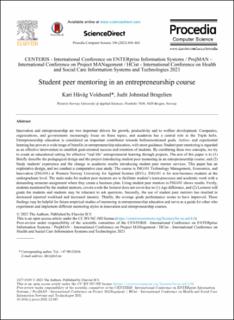| dc.contributor.author | Voldsund, Kari Håvåg | |
| dc.contributor.author | Bragelien, Judit Johnstad | |
| dc.date.accessioned | 2022-10-20T11:48:29Z | |
| dc.date.available | 2022-10-20T11:48:29Z | |
| dc.date.created | 2022-05-10T18:22:43Z | |
| dc.date.issued | 2022 | |
| dc.identifier.citation | Voldsund, K. H., & Bragelien, J. J. (2022). Student peer mentoring in an entrepreneurship course. Procedia Computer Science, 196, 856-863. | en_US |
| dc.identifier.issn | 1877-0509 | |
| dc.identifier.uri | https://hdl.handle.net/11250/3027313 | |
| dc.description.abstract | Innovation and entrepreneurship are two important drivers for growth, productivity and to welfare development. Companies, organizations, and governments increasingly focus on these topics, and academia has a central role in the Triple helix. Entrepreneurship education is considered an important contributor towards beforementioned goals. Active- and experiential learning has proven a wide range of benefits in entrepreneurship education, with more guidance. Student peer mentoring is regarded as an effective intervention to establish goal-oriented success and retention of students. By combining these two concepts, we try to create an educational setting for effective “real life” entrepreneurial learning through projects. The aim of this paper is to (1) Briefly describe the pedagogical design and the project introducing student peer mentoring in an entrepreneurship course; and (2) Study students’ experience and the change in academic results introducing student peer mentor services. This paper has an explorative design, and we conduct a comparative case study. The course is ING101 Technology Management, Economics, and Innovation (ING101) at Western Norway University for Applied Science (HVL). ING101 is for non-business students at the undergraduate level. The main tasks for student peer mentors are to facilitate student’s team-processes and academic work with a demanding semester-assignment where they create a business plan. Using student peer mentors in ING101 shows results. Firstly, students monitored by the student mentors, covers a role the lecturer does not cover due to (1) Age difference, and (2) Lecturer will grade the students and students may be reluctant to ask questions. Secondly, the use of student peer mentors has resulted in decreased reported workload and increased mastery. Thirdly, the average grade performance seems to have improved. These findings may be helpful for future empirical studies of mentoring in entrepreneurship education and serve as a guide for other who experiment and implement different mentoring styles in innovation and entrepreneurship courses. | en_US |
| dc.language.iso | eng | en_US |
| dc.publisher | Elsevier | en_US |
| dc.rights | Attribution-NonCommercial-NoDerivatives 4.0 Internasjonal | * |
| dc.rights.uri | http://creativecommons.org/licenses/by-nc-nd/4.0/deed.no | * |
| dc.title | Student peer mentoring in an entrepreneurship course | en_US |
| dc.type | Peer reviewed | en_US |
| dc.type | Journal article | en_US |
| dc.description.version | publishedVersion | en_US |
| dc.rights.holder | © 2021 The Authors. | en_US |
| dc.source.pagenumber | 856-863 | en_US |
| dc.source.volume | 196 | en_US |
| dc.source.journal | Procedia Computer Science | en_US |
| dc.identifier.doi | 10.1016/j.procs.2021.12.085 | |
| dc.identifier.cristin | 2023235 | |
| cristin.ispublished | true | |
| cristin.fulltext | original | |
| cristin.qualitycode | 1 | |

